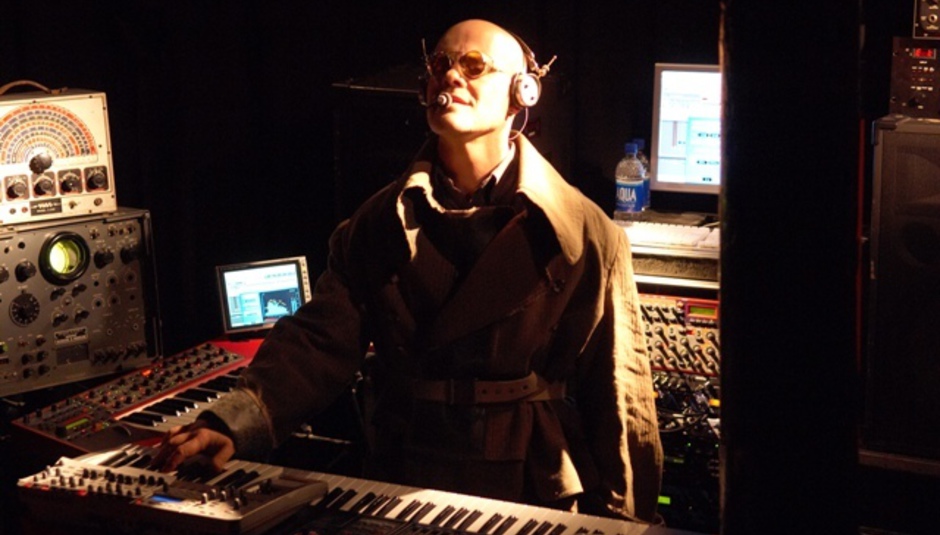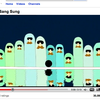Following the recent reissues of synthpop pioneer Thomas Dolby's classic debut The Golden Age Of Wireless and its mini album successor The Flat Earth, journalist Joseph Stannard - Wire, Terrorizer, Plan B - spoke to Dolby for DiS, and discusses his own relationship with these seminal recordings, which oft reside in the shadow of Dolby's 1982 hit 'She Blinded Me With Science'.
I blame my brother. Although he generally viewed his younger sibling with disdain, he occasionally passed down an invaluable fragment of the magic that he was experiencing in his private world, between slinking out of the house to avoid another fight and saving up for white leather trousers he would never wear. One such artifact was a C90 cassette, the inlay of which was hand drawn and featured baffling mathematical etchings. I realise now that these were my brother's ballpoint 'n' compass approximations of the inner sleeve artwork to The Flat Earth, Thomas Dolby's second album, which took up the second side of the tape. The first side comprised one version (there were many configurations) of Dolby's 1982 debut album, The Golden Age Of Wireless, and it was this side that triggered a fascination lasting over 25 years. Appropriately, ...Wireless feels like family, an active part of my personal history. Much of my youth was spent travelling from Middlesex, where I lived, to Berkshire, where I would stay with my grandmother during school holidays. Hurtling down the M4, often through sheets of grey drizzle, I would stare out of the car window at the wind-ruffled fields and isolated homesteads which would eventually form an immovable layer of my own internal landscape. I'd listen to my brother's tape on those journeys, the washed out colours conferred by the brooding clouds matched by the shades of grey and green that emerged from Dolby's synthesizers. If that makes ...Wireless sound depressing, it isn't. It's just incredibly honest and all-encompassing in its Britishness. This is even reflected in 'She Blinded Me With Science', the song that made Dolby a temporary pop star, an almost cartoonishly English take on electro featuring the interjections of the BBC's favourite Mad Scientist, the late Magnus Pyke. The thought of kids in the Bronx locking'n'popping to Pyke's eccentric splutter, which is entirely likely (Dolby would later produce Whodini's hip-hop classic, 'Magic's Wand'), fills my heart with joy. But that track, tacked on to later pressings in the wake of its success as a single, was an interloper on an album overwhelmingly concerned with loss, escape, heritage and war.
The songs are sort of about relationships in the face of something happening on a world level. So there's a sense of 'after the apocalypse' or impending war. A lot of them are very much about the extra weight that's added to emotional feeling in the context of wartime. I think that's a pervading feeling through all the songs. There are lots of references, like in the last verse of 'Airwaves': “No, it was nothing/Some car backfiring”. You get a sense of the relationship that's going on as being overwhelmed by something on a grander level. On 'Europa', you know, it's like, 'let's meet up again after all of this is over'. There's a very strong wartime atmosphere to it.
Unlike OMD's studied evocation of Cold War paranoia on the following year's Dazzle Ships, Dolby's interest in 20th century history appears, to a great extent, personal. When he sings “And I can trace my history/Down one generation to my home/In one of our submarines” ('One Of Our Submarines') he's telling the truth; Dolby's uncle died in a submarine during the Second World War, and his father worked in intelligence overseas. Thus when he later states of his fictional childhood companion Europa, “Father travelled/Mine as well” ('Europa And The Pirate Twins') he further emphasises the short distance between his generation and the one which endured the last global conflict, locating his songs and their characters before a backdrop of international upheaval, taking place in a Ballardian near-future.
My parents are very much of the wartime generation, they had six kids, and my dad was overseas working for intelligence – he was never much of a soldier, but he was away a lot of the time. He came back for visits and knocked my mum up, and that was the next kid for a good few years. I was always struck by the attitude to life that people of their generation had. I suppose, during wartime, they had no idea how long it was going to go on for. When you think back a bit to '39, '45, for all they knew, it could have gone on for 30 years, or it could have ended the next day. So their lives at that time were completely dominated by the fact that they were at war. Also the fact that you couldn't easily go anywhere, there were roadblocks up all over the countryside, you couldn't get a can of petrol to drive anywhere and there was very limited public transport. So in a way, couple that to my interest in science fiction, rather than talk generally about World War 2, and it was more just a case of, well, in any war situation, how does that affect life, and love? That was something that really appealed to me.
Video: Thomas Dolby: 'Flying North'
As with Kraftwerk and Tubeway Army, the melancholy of ...Wireless is inextricably linked to technology. Opening track 'Flying North' is as accurate a depiction of the emotional dislocation of air travel as I've ever come across (although Charlotte Gainsbourg's nightmarish 'AF607105' comes close), a darker, airborne equivalent of 'Autobahn'. Clattering machine percussion establishes a compulsive momentum while the synths hail each connection with weary grace, essaying the glorious solitude of transcontinental aviation, the body clock battery, the implacable onward crawl through the neon hell of the departure lounge. The lyric is perfect: “On the brink of a whole new deal/On the floor of a Pan-Am bar/I'm staring right into the light/And I'm drawn in like a moth/And I'm flying north again...” Dolby doesn't so much write lyrics as direct scenes, and the final verse, which finds him dumped back in England, is breathtaking: “Now I'm back in the London night/On a bench in a laundrette/I'm staring right into my face/And I'm drawn out like a plot/And I'm flying north again tonight.” The song isn't just an extended grumble, though – it also sings of the magic of travel, its eternal lure, and the nomadic habits formed by childhood experience.
I used to think I was rather rootless, because of travelling around quite a lot as a kid. I never had a neighborhood that I felt I belonged to, really. I like to travel and I like the unexpected experiences of being in a new place and finding out how that affects your mood and your imagination. Then, I think, pursuit – travel as a means of pursuing something, whether it's a woman, a dream, or something to do with your career, the adventure involved. That was always quite important to me.
When the songs deal more identifiably with matters of an interpersonal nature, such as the loss of a lover in 'Weightless', they're notable for their hugely affecting imagery: “Same old insecurities/Strap him into his car seat/And a sump started leaking/All over New Jersey/Gas stations everywhere/Not one drop to fill me.” Dolby's focus on location, his ability to find an emotional analogue in his environment, indicates that he was always more than a mere 'synth wizard' – he was also a songwriter of prodigious imagination and ability.
It's that British thing, really, rather than get right to the heart of it and talk about the relationship itself, you tend to focus on external, third party things that are often out of our control. There's a very strong sense of the planet on the album, I think, 'Flying North' and the idea of being “tethered to the poles” and the idea of conditions dictating mood.
This is also evidenced in the world-weary 'Airwaves': “Knee deep in water/Under a pylon/How slow my heartbeat/How thin the air I'm breathing.” I'm thinking back to the moments during cross-country trips when I gazed out at those iron giants, considering them with awe as they imposed their monumental will upon the British countryside, holding the nation together over vast distances. 'Airwaves' shares a spirit with Bowie's Berlin-era ballads, its climactic fanfare transmitting a metallic ennui comparable to that of the ageless 'Always Crashing In The Same Car' and 'V2 Schneider'. Like much of the album, it's a grandiose yet solitary sound, a sonic document of small human gestures taking place within a broad, all-encompassing vista.
I always err towards being on my own. I'm definitely an introvert, and at times I lead a fairly hermit-like existence. But these two albums were done before I hit 30 and started a family. I still have an impulse to go off on my own, and I have to snatch that in between responsibilities to the family. But I'm probably most stimulated artistically when I'm on my own.
The finale, 'Cloudburst On Shingle Street', constitutes the album's most conspicuous nod to the European tradition of electronic music, harnessing the beatific chime of 'Schöne Hände' from 1977's Cluster & Eno album within an chart-ready pop format. A corrugated low-frequency pulse is pelted by crystalline synthdrops as the protagonist rushes into the oncoming storm, again, atmospheric conditions offering the perfect mirror image of release and redemption: “And it's dawning on me/I've been a cork in the ocean/Been bobbing in the North Sea/Then take this vest of plaster/These boots of concrete/And mark them down as surplus/Return to Mulberry.” The standard accusation levelled at electronic pop in the early Eighties was that it was soulless, emotionally inert. This song, like Kraftwerk's 'Neon Lights', The Human League's 'Dreams Of Leaving', Numan's 'Are 'Friends' Electric?' and indeed the rest of ...Wireless, offers ample evidence to the contrary.
I remember word going around that the UK branch of the Musician's Union was going to vote on a motion to ban synthesizers. A friend of mine from a band called Landscape told me this, and said we had to get some people down there because they were actually going to put it to the vote. The motion that was on the table was that synthesizers would be banned altogether, because they were taking work away from musicians. So ten of us went down there, one row of about 30, 40 people, and the rest of the people were like, out of work flugelhorn players, people who occasionally did West End musicals, and they were all half asleep. Each of the ten of us in turn got up and spoke very passionately and very articulately about how we felt it was progress and it was a good thing, and ultimately would lead to more work for musicians. Then it went to the vote and it got voted in! The British Musician's Union had banned synthesizers! I think it was only afterwards that the executive manager of the Musician's Union realised how impossible it would be to implement, so it was sort of swept under the carpet and we never heard about it again.
...Wireless is the first record I genuinely loved, and the fact that it has retained its mystique for so long serves as confirmation of its enduring brilliance. Of course, I would say that – but thanks to my brother, I heard plenty of jaw-dropping music as a kid, and while I'll willingly confess my admiration for, say, Oil On Canvas by Japan, nothing else I heard back then made anything like the same impression as this debut. Dolby's later work, though often excellent, doesn't quite make the same leap from pop to sonic fiction. Recording of the follow up to ...Wireless was curtailed due to the promotional demands thrown up by 'She Blinded Me With Science', and The Flat Earth was issued in 1985 as a seven track mini-album. While The Flat Earth lacks the conceptual consistency and idiosyncratic nuances of its predecessor, it's by no means without merit – 'Screen Kiss' and the title track are humid ambient soul, 'Dissidents' is hardwired funk concrète, 'White City' is an icy blast of dystopian futurism, and the mini-album's decidedly cinematic sweep hints at Dolby's burgeoning ambition towards the film industry, which would eventually be realised via scores for George Lucas's Howard The Duck and Ken Russell's Gothic, excerpts from which are included as bonus tracks. But Wireless remains the untouchable masterpiece. It is now what it was in 1982, an album out of time, employing cutting edge technology as a means of reconstructing and reconfiguring the past into a unique vision of the future.






















